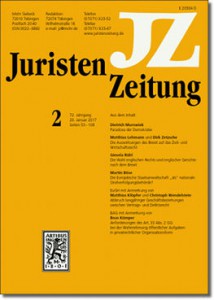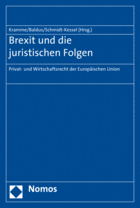By Stephan Walter, Research Fellow at the Research Center for Transnational Commercial Dispute Resolution (TCDR), EBS Law School, Wiesbaden, Germany.
On 10 November 2016, the Academy of European Law (ERA), in co-operation with the European Circuit, the Bar Council and the Hamburgischer Anwaltverein, hosted a conference in London on “The Impact of Brexit on Commercial Dispute Litigation in London”. The event aimed to offer a platform for discussion on a number of controversial issues following the Brexit referendum of 23 June 2016 such as the future rules governing recognition and enforcement of foreign judgements in the UK, the impact of Brexit on the rules determining the applicable law and London’s role in the international legal world.
Angelika Fuchs (Head of Section – Private Law, ERA, Trier) and Hugh Mercer QC (Barrister, Essex Court Chambers, London) highlighted in their words of welcome the significant impact of Brexit on business and the practical necessity to find solutions for the issues discussed.
In the first presentation, Alexander Layton QC (Barrister, 20 Essex Street, London) scrutinised Brexit’s “Implications on jurisdiction and circulation of titles”. He noted that the Brussels I Regulation Recast will cease to apply to the UK after its withdrawal from the EU and examined possible ways to fill the resulting void. Because an agreement between the UK and the EU on retaining the Brussels I Regulation Recast seemed very unlikely, not least because of the ECJ’s jurisdiction over questions of interpretation of the Regulation, he favoured a special agreement between the UK and the EU in regard to the application of the Brussels I Regulation Recast based on the Danish model. The ECJ’s future role in interpreting the Regulation could be addressed by adopting a provision similar to Protocol 2 to the 2007 Lugano Convention. Yet it was disputed whether or not the participation of the UK in the Single Market would be a political prerequisite for such an arrangement. He argued that there would be no room for a revival of the 1988 Lugano Convention since the 2007 Lugano Convention terminated its predecessor. Furthermore, neither a revival of the 1968 Brussels Convention nor the accession to the 2007 Lugano Convention would lead to a satisfactory outcome as this would result in the undesired application of outdated rules. In a second step Layton discussed from an English point of view the consequences on jurisdiction and on the recognition and enforcement of judgements if at the end of the two year period set out in Article 50 TEU no agreement would be reached. Concerning jurisdiction the rules of the English law applicable to defendants domiciled in third States would also apply to cases currently falling under the Brussels I Regulation Recast. In regard to the recognition and enforcement of judgements rendered in an EU Member State pre-Brussels bilateral treaties dealing with these questions would revive, since they were not terminated by the Brussels I Regulation and its successor. Absent a treaty between the UK and the EU Member State in question the recognition and enforcement would be governed by English common law. Likewise, the recognition and enforcement of English judgements in EU Member States would be governed by bilateral treaties or the respective national laws. In Layton’s opinion, the application of these rules might lead to legal uncertainty. He concluded that both the 2005 Hague Choice of Court Convention and arbitration could cushion the blow of Brexit, but limited to certain circumstances.
Matthias Lehmann (Professor at the University of Bonn) analysed the “Consequences for commercial disputes” laying emphasis on the impact of Brexit on the rules determining the applicable law to contracts and contracts related matters, its repercussions on pre-referendum contracts and potential pitfalls in drafting new contracts post-referendum. Turning to the first issue, he summarised the current state of play, meaning the application of the Rome I Regulation and Rome II Regulation, and stated that these Regulations would cease to apply to the UK after its withdrawal from the EU. In regard to contractual obligations this void could be filled by the 1980 Rome Convention, since the Rome I Regulation had not replaced the Convention completely. Still, this would lead to the application of outdated rules. He therefore recommended to terminate the 1980 Rome Convention altogether. Regarding non-contractual obligations the Private International Law (Miscellaneous Provisions) Act 1995 would apply. Lehmann noted that – unlike the Rome II Regulation – this Act contained no clear-cut rules on issues such as competition law or product liability. Because of these flaws he scrutinised three alternative solutions and favoured a new treaty between the UK and the EU on Private International Law. Even though disagreements over who should have jurisdiction over questions of interpretation could hinder the conclusion of such an arrangement the use of a provision similar to Protocol 2 to the 2007 Lugano Convention could be a way out. If this option failed, the next best alternative would be to copy the rules of the Rome I Regulation and the Rome II Regulation into the UK’s domestic law and to apply them unilaterally. As a consequence, the UK courts would not be obliged to follow the ECJ’s interpretations of the Regulations causing a potential threat to decisional harmony. Furthermore, the implementation could cause some difficulties because the Regulations’ rules are based on autonomous EU law concepts. Finally, he rejected a complete return to the common law as this would lead to legal uncertainty and potential conflicts with EU Member States’ courts. Lehmann subsequently discussed Brexit’s repercussions on pre-referendum contracts governed by English law. He submitted that in principle Brexit would not lead to a frustration of a contract. By contrast, hardship, force majeure or material adverse change clauses could cover Brexit, depending on the precise wording and the specific circumstances. Concerning the drafting of new contracts he pointed out that it would be unreasonable not to take Brexit into account. Attention should be paid not only to drafting provisions dealing with legal consequences in the case of Brexit but also to Brexit’s implications on the contract’s territorial scope when referring to the “EU”. If the contract contained a choice-of-law clause in favour of English law, Lehmann suggested using a stabilization clause because English law might change significantly due to Brexit.
The conference was rounded off by a round table discussion on “The future of London as a legal hub”, moderated by Hugh Mercer QC and with the participation of Barbara Dohmann QC (Barrister, Blackstone Chambers, London), Diana Wallis (Senior Fellow at the University of Hull; President of the European Law Institute, Vienna and former Member of the European Parliament), Burkhard Hess (Professor and Director of the Max Planck Institute for International, European and Regulatory Procedural Law, Luxembourg), Alexander Layton QC, Matthias Lehmann, Ravi Mehta (Barrister, Blackstone Chambers, London) and Michael Patchett-Joyce (Barrister, Outer Temple Chambers, London). Regarding the desired outcome of the Brexit negotiations and London’s future role in international dispute resolution the participants agreed on the fact that a distinction had to be made between the perspectives of the UK and the EU. Concerning the latter, the efforts of some EU Member States to attract international litigants to their courts were discussed and evaluated. Moreover, Hess stressed London’s role as an entry point for international disputes into the Single Market – an advantage London would likely lose after the UK’s withdrawal from the EU. Patchett-Joyce argued that Brexit was not the only threat to London’s future as a legal hub but that there were global risks that had to be tackled on a global level. In regard to the Brexit negotiations there was widespread consensus that the discussion on the future role of the ECJ would be decisive for whether or not an agreement between the UK and the EU could be achieved. Wallis argued that Brexit might have a very negative impact on access to justice, not least for consumers. To mend this situation, Lehmann expressed his hope to continue the judicial cooperation between the EU Member States and the UK even post-Brexit. An accession to the 2005 Hague Choice of Court Convention was also advocated, though the Convention’s success was uncertain. Turning to arbitration, since, as Mehta noted, its use increased significantly in numerous areas of law, and on a more abstract level to the privatisation of legal decision-making, Wallis and Patchett-Joyce addressed the problem of confidentiality and its repercussions on the development of the law. Furthermore, Dohmann stated that it was the duty of the state to provide an accessible justice system to everybody. It would not be enough to refer parties to the possibility of arbitration. Finally, Layton argued that in contrast to the application of foreign law which would create significant problems in practise, the importance of judgement enforcement would be overstated because most judgements were satisfied voluntarily.
It comes as no surprise that these topics sparked lively and knowledgeable debates between the speakers and attendees. Though these discussions indicated possible answers to the questions raised by the Brexit referendum it became clear once more that at the moment one can only guess how the legal landscape will look like in a post-Brexit scenario. But events like this ensure that the guess is at least an educated one.


 The current issue of the JuristenZeitung features two articles dealing with the effects of Brexit on private and economic law, including private international law.
The current issue of the JuristenZeitung features two articles dealing with the effects of Brexit on private and economic law, including private international law. The most interesting chapter for readers of this blog is the chapter by Johannes Ungerer from the University of Bonn. It deals with the effects of Brexit on the Brussels I Regulation and other Regulations on European private international law and can be downloaded
The most interesting chapter for readers of this blog is the chapter by Johannes Ungerer from the University of Bonn. It deals with the effects of Brexit on the Brussels I Regulation and other Regulations on European private international law and can be downloaded